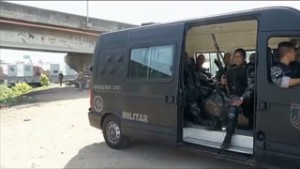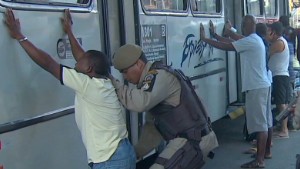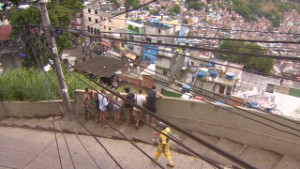- Just past a World Cup stadium is a notorious red light district
- Brazil agencies are cracking down on child prostitution ahead of the tournament
- One survivor tells CNN girls see selling sex as easy money
- Critics say child sex trade is being pushed aside for the World Cup but not tackled
Fortaleza, Brazil (CNN) -- The newly-renovated Castelao football stadium looms into sight up ahead. Driving just past it, we see women standing on street corners, leaning into cars and flashing nearly naked bodies in the low light.
We're in Fortaleza in the northeastern corner of Brazil, one of the World Cup host cities but also known as a magnet for sex tourism.
Prostitution is legal in Brazil for those 18 or older, but government and soccer officials are trying stto crack down on the child sex trade before the tournament kicks off in June.
Antonio Carlos da Silva, a social worker with O Pequeno Nazareno, says the prostitutes around the stadium now cater to truckers but dream about big bucks from visiting fans.
"Ever since Brazil was selected to host the World Cup in 2014, it created these huge expectations," he says as we drive down a darkened avenue.
 Weapons confiscated ahead of World Cup
Weapons confiscated ahead of World Cup  Welcome to murder capital of Brazil
Welcome to murder capital of Brazil  Would you stay in a Rio shanty town?
Would you stay in a Rio shanty town? "The girls keep asking me "where can I take English classes so I can get more clients?""
We pull up to chat with Taina, an 18-year-old transsexual who has been working the streets since she was a minor. "Sometimes people want trannies, sometimes they want girls," she says.
Hiding down side streets
She says that child prostitutes hide down side streets or behind bus stops.
According to critics, officials have pushed the child sex trade out of sight, but haven't done enough to eradicate its root causes. They warn underage prostitution could explode during the World Cup.
"These girls come from extreme poverty, a culture of social exclusion and a tradition of profound disrespect for women," says Antonia Lima Sousa, a state prosecutor.
She says the desperation is so great, some parents even put their own children on the street.
But there is also a serious problem with organized crime.
"It involves a whole tourism network, from agencies to hotels to taxis," she says. "With these mega events, sexual exploitation is also going to be organized much more via the Internet."
Despite promises to eradicate child prostitution, the number of estimated child sex workers in Brazil stood at about half a million in 2012, according to the non-profit National Forum for the Prevention of Child Labor.
Fortaleza is considered a hotspot for child sex tourism, due in part to the widespread poverty as well as a now long-standing reputation that means potential clients continue to seek out the beach resort over other Brazilian destinations, often chartering planes direct from Europe, according to prosecutors.
It will also host six World Cup games including teams and fans from Germany, Greece, Mexico and the Ivory Coast.
Antonia Lima Sousa, state prosecutor
A total of 600,000 foreign visitors are expected in Brazil and another three million Brazilian fans are expected to travel around the country.
New ad campaign
The Brazilian government set aside 8 million reais, or about $3.3 million, to combat the child sex trade in host cities.
Footballers have also taken a stand in a new ad campaign ahead of the 2014 World Cup, featuring Brazil's David Luiz and England's Gary Lineker, among others.
"Sadly, some people will use this opportunity to sexually exploit children," Lineker says in the video. "Paying for sex with anyone 17 or under is absolutely illegal."
In Fortaleza, there has been a police crackdown on child prostitution and the city government says it has implemented new programs, but officials refused to be interviewed by CNN. We were welcomed by a handful of non-profit groups helping get children and adolescents off the street.
O Pequeno Nazareno works directly with street children, including young boys who have been forced into the sex trade, offering food and shelter and even organizing a football team.
The Catholic group Sisters of Remption takes in pregnant teens who have been sexually exploited.
There we meet Bruna, who was 12 when she ended up on the street, addicted to crack cocaine. She says she tried not to get involved in prostitution.
"There was a time when I had to, it was my last resort," she says. "I went to a motel with this guy who was 47 and got my 20 reais." That's about $9.
Bruna is now 15 and eight months pregnant. She is living in a small, but neat room in the sisters' house, with her own bed, a crib and a private bathroom.
Sister Maria says that last June during the Confederations Cup, a kind of dry run for the World Cup, underage prostitutes and street children were swept up by police and taken to a shelter outside of town. But after the tournament was over, they were turned loose. Police refused to speak with CNN for this report.
Gary Lineker, former England footballer
"They aren't worried about these children growing up in a healthy environment, with jobs and housing, health and education," she says. "They're worried about hiding them."
Job training for victims
Nearby, the non-profit Vira Vida provides basic schooling and job training for young victims of sexual exploitation. Many turn into cooks, hairdressers and computer technicians.
Jucileide, now 21, completed the training and has an internship at a bank.
"I was a call girl," she tells us. "I was 13 when I started." At first she didn't tell her unemployed mother. "When she discovered, I was 15. She cried and asked me to stop, but I said "mom, it's easy money.""
The next day, Jucileide takes us to the beach bars where she used to pick up foreign tourists.
"The ones that have more call girls are those two," she says pointing to plastic yellow tables and chairs that line the sidewalk, full of a mix of locals and tourists.
At night, they fill with older foreign men, mostly from Europe. Young women in skimpy clothing hover nearby, exchanging phone numbers or walking off arm-in-arm with the older men.
Experts say that after hotels started barring girls under 18, clients began to rent apartments or head to so-called love motels.
The late-night scene down the road is much more brazen. Prostitutes hang out on corners and even congregate in front of the police station, shaking their backsides at cars as they drive by.
Fake IDs
Many look like they are barely in their teens, but experts say they use fake IDs. Down a side alley, we find two girls who say they're 16 and 17 but look much younger. They don't smile and talk barely above a whisper.
"I've been doing this for two months," says one girl. The other one says: "We use the money to buy things we need, clothes, school supplies."
They say they don't have pimps or protectors and when clients refuse to pay, they have to walk hours to get home.
On every corner, another sad story. Some girls even tell us they stayed on the streets through teenage pregnancies, including Jucileide.
She turned her life around with the help of Vira Vida, but says where she comes from, the sex trade is easy money.
No comments:
Post a Comment